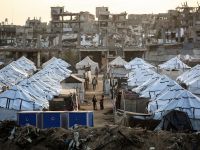Mohammed Al Baali
Albawaba.com - Cairo
No Arab movement has won as much success and public interest over the past few years as the Lebanese Hizbollah resistance, with the Islamist party’s secretary general, Hasan Nasrallah, attaining the status of a new Che Guevara in the eyes of Arab, and particularly Muslim, youth.
In the hands of Hizbollah, Katyoshas developed from rockets with limited destructive power into potent symbols of horror to the Israelis. The Israeli withdrawal from the south has been attributed completely to Hizbollah. Even Palestinians, whose flags and kufiyyas were once the symbols of youth resistance from the Atlantic Ocean to the Arabian Gulf, now carry Hizbollah flags during their demonstrations.
Meanwhile, Nasrallah addresses the Palestinians via his mobile phone, urging them on to jihad (holy war).
What lies behind these successes and strategies? A dialogue with a Hizbollah leader will help shed light on one of the most important players in Middle Eastern politics.
Ammar Al Moussawi, one of Hizbollah’s outstanding leaders, is a member of the Lebanese parliament and part of the party’s politburo. He hails from the family of Abbas Moussawi, the former party secretary general, who was assassinated in February 1992 by an Israeli missile reportedly guided by a television camera and fired froma helicopter as Moussawi was returning to Beirut from the southern village of Jibchit.
Our talk with Moussawi was extensive, spanning Hizbollah’s operations and its strong relations with Syria, as well as the party’s relationship with the Lebanese political structure.
Following are excerpts from the interview:
Q. After the Israeli withdrawal from most of the southern area, many reckoned that Hizbollah would change from a resistance movement into a traditional political party and integrate itself into the Lebanese political structure, with all its factional and de facto class nature. Where does this expectation stand one year after the Israeli withdrawal?
A. The success or failure of this expectation depends on Hizbollah. Had we wanted to participate in the Lebanese political game, we would have entered it long ago, even before the Israeli withdrawal. We were offered the chance to play a role in this game, and to get our share of the political pie, but we did not. We did not fight in order to get our share of the pie, because we don’t believe in this political game.
The offer has recently been renewed, by asking us to stop resisting in exchange for seats in the parliament and other things. Furthermore, there are frenetic American attempts to put an end to Hizbollah’s threat to Israel, but we are resisting determinedly.
Q. Some people are afraid that your operations might lead the region into a full-scale war. Others are calling on the Arab countries not to let Hizbollah dictate their foreign policy, indicating that its operations create tension in the region at the wrong time. What are your comments?
A. Some people think that Hizbollah is an adventurer that may win one time, and lose another, bringing about catastrophes. To these people I say: Hizbollah is not an adventurer, but rather is logical and realistic. It has never acted at the stimulus of its own strength, but rather from its courage and wisdom.
This has been proven by the rallying of the Lebanese people around it, because [Hizbollah] has proven to them that resistance can cost a little but reap a lot. By any standard, when you offer somebody a fruitful result for a small cost, he will accept it. If we look at the operations Hizbollah has carried out over the year since liberation, we find that it struck only in the Shabaa Farms. The borders have not been attacked, and the Israeli settlements parallel to them now live a stable life. This situation puts pressure on Sharon, because his attempts to keep peace in the area require a lot from him.
Q. Has any of the Arab countries tried to utilize this wisdom to urge you to accept a peace settlement, even by a truce or something similar?
A. There is a difference between reality, wisdom and philosophized surrender. We have repeatedly confirmed that we reject the peaceful settlement completely. Our stand has led to differences between the Lebanese government and us, between our methodology as a resistance and theirs as a state. For our part, there is no difference between the two, as all that is needed is a little foresight, a little planning and a lot of persistence.
Q. How about the relationship of the party with Syria, which has prompted some observers to say that Hizbollah movement is bound to Syria?
A. Had Hizbollah chosen not to fight Israel, no power on earth could have compelled it to do so. Nobody can kill himself unless he is convinced about what he’s doing. Hizbollah lives in Lebanon, fights from its lands and knows how to use aid from friends. Syria is one of the resistance supporters, so isn’t it wise to coordinate with them, particularly when they protect our backs and support us in international organizations?
Q. We see Hizbollah flags raised at Palestinian demonstrations and the great admiration by the Palestinians for the party’s experiences. Do your actions provide a role model for resistance in the area?
A. Hizbollah is not a model for anybody, and it shouldn’t be. Our experience itself has been developed from the first until the last operation. Therefore, the resisting Palestinians are not in need of somebody to teach them. Hizbollah is not a state, so it has no embassies in other countries. We support the Palestinian people by our resistance in Lebanon.







